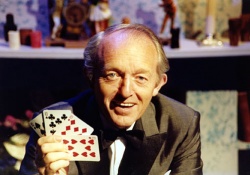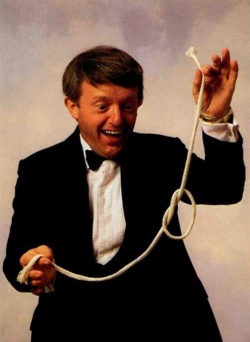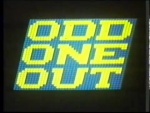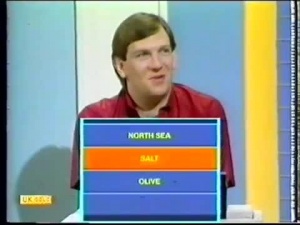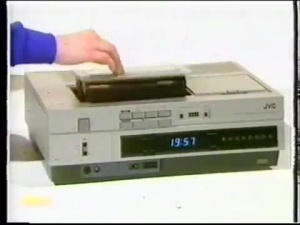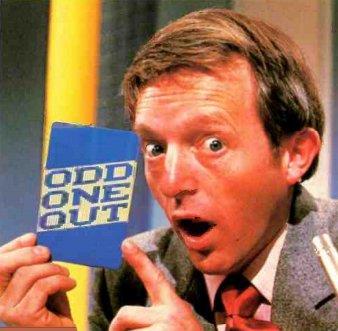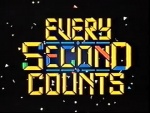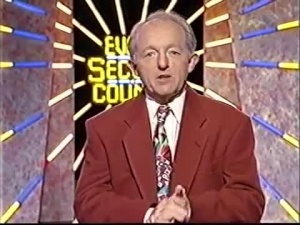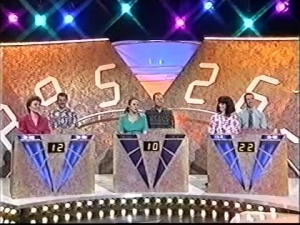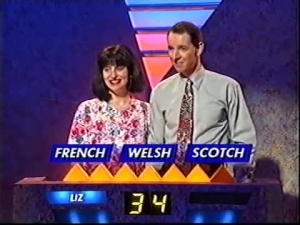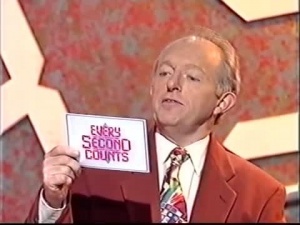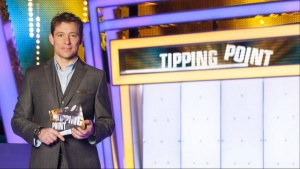Weaver's Week 2016-03-27
Last week | Weaver's Week Index | Next week
"The two most popular stars were Terry Wogan in Blankety Blank and Paul Daniels in any of his magic shows." – BBC Yearbook, 1983.
Contents |
Paul Daniels
The Unusualist
Paul Daniels was born in South Bank, near Middlesbrough, on 6 April 1938. His parents, Hugh and Nancy, managed the local cinema. A book called "How to Entertain at Parties" sparked Paul's interest in magic. He devoured all the books on magic in his local library, performed at a youth club, and set his heart on becoming a professional magician.
He performed with his wife Jacqueline Skipworth as "The Eldanis" in the 1960s, giving up his day jobs around 1969. The club circuit was impatient, and poor performers would be heckled. Good showmen would get their retort in first: "You'll like this. Not a lot, but you'll like it."
Daniels appeared on ITV's Opportunity Knocks and the BBC's Ace of Clubs. Daniels was soon a regular on The Wheeltappers and Shunters Social Club, which tried to be a working men's club on ITV. He provided the magic in the "magic, music, and mirth" show For My Next Trick (BBC1, 1975-6) with Faith Brown and Terry Seabrook.
1978 was a good year: billed as "Television's fastest rising magic star", Daniels went from cabaret on the Marti Caine Show to the Royal Variety Performance. His own shows began in 1978 – Paul Daniels' Blackpool Bonanza on ITV, Paul Daniels Magic Show on the BBC. He made a home at the Beeb, and he did such varied fare as Blankety Blank, a "magic music" show on Radio 2, Pro-Celebrity Golf, and Disney Time. It was a rare month when Paul didn't appear on one show or another.
Daniels' stage assistant at Great Yarmouth in summer 1979 was Debbie McGee, a dancer with the Iranian ballet left stranded by that country's revolution. The two married in 1988. Daniels's squeaky-clean image was tarnished on Hallowe'en 1987, when a "live" stunt appeared to end with him being trapped in an iron maiden.
He made Wizbit, gentle puzzles for primary school children. He wrote computer programs, Learn Spanish On Atari 800 was mostly his own work. He generated the tricks for the play Phantom of the Opera. He did work for charity: he would open a fête and stay all afternoon; he would spend an hour or two with children who had behaviour problems and listen to them.
Paul Daniels won awards. His fellow tricksters said he was Magician of the Year in 1982, The Maskelyne in 1988 and the Great Lafayette in 2011. From light entertainment, Royal Television Society awards in 1981 and 1982, the Variety Club's Showbiz Personality of the Year 1981, and his Easter 1984 show won the Golden Rose of Montreux for Best Television Programme In The Entire World.
All good things come to an end – the Magic Show was cancelled in 1994, replaced by Paul Daniels' Secrets, "more intimate" performances. Fashion had moved on, and Daniels' earnest approach had fallen out of vogue. He didn't get a regular television series afterwards.
His public performances in the new century were limited: a documentary with Louis Theroux (2000), Paul Daniels in a Black Hole (2001) sought a career in Illinois. He was able to laugh at himself, demonstrated on Shooting Stars (2002) and Genius (2005). He might have scraped the barrel on The Farm and The X Factor Battle of the Stars. Daniels kept a detailed weblog, where he explored contemporary life without inhibition.
All of this helped to re-evaluate a complex personality. Yes, he'd been over-exposed in the late 1980s; yes, familiarity bred contempt by the mid 1990s. With the clarity from time passing, we could see he was passionate about entertainment and stagecraft. He had always used his fame to support and boost the next generation of performers.
Part of Daniels' success was his string of television game shows. They contributed to his over-exposure, too. Thirteen magic shows during the winter, repeated in the spring. Then sixteen game shows during the summer, and he'd pop up on other variety shows. For almost two decades, it was an unusual week when Paul Daniels wasn't on television screens.
We looked at Wipeout in summer 2008, and have nothing much to add here.
Back in 1977, NBC had made a quiz called Knockout. It took five years for the format to cross the Atlantic.
Odd One Out
BBC1, 1982-85
Odd One Out had a very simple premise. Here are four things. Three of them are linked, one of them does not belong. Which is the odd one out, and why?
The show was a little bit more complex, but not a lot. The returning champion was first amongst a field of three players. Paul introduced the trio, had a quick chat. With very little fluff, we were into the game proper.
Spotting the odd one out was the first task, and a correct answer was worth two points. Whoever spotted the odd one out could identify the link, and earn three points. Or they could challenge one of the other players to name the connection – three for the right answer, or a successful challenge.
The connections were fair: between them, the three words or short phrases would specify one answer. Paul was generous about synonyms or alternatives.
Eight questions – more if a tie-break was needed – before "a wibbly-wobbly noise" indicated the end of the round. The winner went on to play the bonus game – up to three clues for a connection, more clues meant a less good prize. Then we played again with three new contestants. NBC put up adverts after each round, and the winner was first to eight points.
Back in Britain, the two heat winners met in the show's final. Here were some picture clues and – ba-bing! – music clues. Again, which tune or picture is the odd one out? The show's winner faced a Big Prize: one clue, and one clue only, to make a connection. This is for a very decent prize – a dishwasher, or a European break.
Odd One Out was a no-nonsense format, very little filler and about one question per minute. Paul kept the game moving along, he'd explain the answers and throw in some one-liners.
Looking back, we see that the links were tough – but an early-evening BBC1 audience will get them. See all four in a set and it's pretty easy to work out the link and the one that doesn't belong. See three and it's possible to link two and reject one. The show would not put the odd one out last, that would be a buzzer race. From one or two clues, it's more intuition.
And we think, hmm. Hmmmmm. Did a young Victoria Coren watch and enjoy Odd One Out? There's a certain echo between Odd One Out and Only Connect. Yes, Odd One Out is some degrees easier, and deigns to offer such vulgar trash as prizes. But both shows are rigorous, and make their own entertainment from unlikely matter.
Would a Knockout revival – perhaps using the UK scores – help to introduce Only Connect to a foreign audience? Or is Odd One Out about as difficult as the market over there would take?
Dealing with Daniels
Radio 2, 1982-89
Around the same time, Paul hosted a panel quiz. It was in the tradition of the Light Programme, a 30-minute slot for questions and answers and general fooling about.
The basic idea was simple. Ian Messiter took a pack of cards, and ran from 7 to 10, Jack, Queen, King and Ace. A "short deck", like the host. On each card, he'd pin a question. Each suit had a theme – so Clubs might be general knowledge, Diamonds the natural world, Hearts could be history, and Spades to sing along with the song lyric Paul reads.
In turn, the players picked a card from a suit. The order of players was fixed, the order of suits was fixed. With three players and four suits, it was difficult to remember what was left, and there were penalty points and varied difficulties and jokers to cancel out the penalties.
All of this sounds complex when written on paper. But to hear, it's an absolute breeze. Paul only explains as much of the rules as he needs to at any time. We're not listening for the rules, we're listening for the entertainment. We're here for the questions, written by the tricksy Mr. Messiter. We're here for the jokes of Duggie Brown, for the grouchiness of Patrick Moore. Paul does keep score, he does declare a winner, but we come away thinking "that was an entertaining show".
Every Second Counts
BBC1, 1986-93
On the television, Daniels had a new show in 1986. Every Second Counts was another import, the Westinghouse company had syndicated the show in North America during the 1984-5 season.
Paul would give a category, such as "Cartoon animals". All of the things are either cartoon dogs, or cartoon cats. If it's a dog, say "Wuff, wuff"; if it's a cat, say "Meeeow".
And that's the game in a nutshell. Simple questions, either-or answers. But rather than give a straight answer, Paul asks the contestants to entertain us. Work for your prizes, this is a fun show, be a bit silly. So we see a stockbroker barking at the moon, a dressmaker purring like she's got the cream. Paul might bring out props to demonstrate a point.
Every Second Counts was strictly a game for married couples, perhaps the last mainstream hit to insist that its players were so certified. At this early date, marriage was always between man and woman, and Paul would ask the man to introduce his wife, and the woman to introduce her husband. There was a little banter, but it didn't get in the way of the game.
The rounds were neatly paced. Three couples and nine questions, so at least three questions each. Always start with the team in last place – a rule that just happened and didn't need to be waved in the audience's face. A team would be frozen out when they gave a wrong answer, so it's easier for the trailing side to face extra questions.
A further segment let each couple to earn extra time. Paul would read out a question, such as "Who was king of England in 1200?" There are many possible answers, only one is right. If the contestants could shout out "King John" at the start, they'd get 10 seconds. Otherwise, the clock started, while the couple ran through possibles "Henry I, Henry II. William III, Henry III. Replay at Stamford Bridge." It stopped when the pair gave the right answer.
Every Second Counts was a contest for married couples, but this little bit was the only part where either player could answer. Most of the time, one player was in "the driving seat", and their partner a mute backseat passenger. The couples decided for themselves who went first; on the Westinghouse original, wives always led off. Their answers were worth 2 seconds, the husbands earned 4 seconds. Westinghouse's show didn't have the countdown questions, or lights to show who was in and out of each round.
After about twenty minutes – three quiz rounds for him, three for her, plus two additional questions – we found a winner. The losers went away with Every Second Counts watches and clocks, each complete with a second hand. The winners were off to earn prizes.
As a rule of thumb, a couple would need at least 40 seconds to win the game. They'd need a minute and more to claim the jackpot prize. This was very possible – if everyone got every question right, there'd be a triple tie on 74 seconds. The time the winners accumulated in the earlier rounds comes with them to the final.
For the final, the pair picked from two categories. Paul read out a question with three possible answers, for instance "I'm going to read out a list of items. Each can be preceded by 'bell', 'book', or 'candle'. I need you to say, 'bell', 'book', or 'candle'." No larking about in the final round, this is serious stuff.
Four right answers to win the first prize, and that's theirs to keep. And with 40 seconds, even if the couple have to guess at every question, they'll win it by chance.
Another round, another question, and five answers to win a second prize. They have to win it in the time from earlier in the game, minus however long it took to win the first prize.
But we don't want to give you that! It's on to the next prize, six answers. The grand prize was a foreign holiday, plus whatever gift they won at the start of the final. And that's that: all six contestants join Paul to wave goodbye during the end credits.
There's only about one episode of Odd One Out and Every Second Counts on the usual video sites. Wipeout fares better, and episodes sometimes go out on the Challenge channel. Dealing With Daniels is also represented.
While preparing this article, we've heard the audio from an episode of NBC's Knockout and seen Westinghouse's Every Second Counts. We can understand why neither show lasted long. We also saw Wizbit.
And we do recommend the 1985 Golden Rose of Montreux winner: Paul Daniels Magic Easter Show.
From all of Paul Daniels' quizzes, we have three takeaways.
1) Interesting formats, something beyond a straightforward question and answer. Even the basic quiz Dealing With Daniels was combined with a memory game, and the particular wit of Ian Messiter.
2) No faffing about. Paul didn't spend hours talking to players, he got on with it. He didn't introduce all the rules at once, and sometimes didn't mention a rule at all.
3) Make the shows fun. Paul was a natural entertainer, and worked hard to bring extra fun to his quizzes.
Paul Daniels was diagnosed with a brain tumour in February. He died on 17 March, aged 77.
University Challenge
Quarter-final 3: York vs Imperial
This section explains why we no longer recap University Challenge every week.
York came through the top half of the draw, losing to Peterhouse Cambridge and beating St Catharine's Cambridge. Imperial lost to Liverpool in the bottom half, having already beaten Nuffield Oxford.
York kicked off with bonuses on George Orwell and "dwarf planets"; Imperial got a penalty for confusing polio with typhoid. The producers assessed a penalty for a buzz here:
- Q: In England and Wales, the county officials who are the holders of the oldest secular royal appointment in the UK have what two-word designation?
The producers are talking cack. That wasn't an interruption. Paxman had clearly stopped, finished, ended the question. Even if he hadn't read what's on the card, he has finished the question.
That the producers treat "the question" as "everything written on the card" is wrong. So far at this column is concerned, "the question" finishes at the end of the sentence where there is enough information to uniquely define the answer; in this case, "high sheriff".
Everything else is waffle. University Challenge has been full of waffle for over ten years. Take your "fine", stick it where the sun doesn't shine, and come back when you've got some halfway decent questions.
This decision did not alter the result. After the first picture round, York's lead on screen was 100-5, and we're fast losing interest. Imperial pulled it back to 100-45, York got questions on the full names of South American countries, and on churches called Norman.
And the contest drifted on: Imperial remained between 30 and 80 adrift, never close enough to seriously threaten, never far enough away to let York have an easy game. We were intrigued by the concept of a question about words formed by silent letters, but the requirement to "answer audibly" tells us the producers are spoilsports.
York ran away with it in the final stages, and their winning score was 260-135.
Mastermind
Semi-final 6
Last of the second-round matches, and Tom Williams was the only contender to be out of it after the specialist round: he'd scored 5 (2 passes) on Benjamin Britten, but shot up to 19 (3 passes) at the final. Watch this contender, the student feels like someone who could come back in a later series.
Margaret Brown was briefly disoriented by her first question on Prohibition, and only scored 9. The general knowledge rather fell away towards the end, finishing on 18 (0). Jeremy Renals had a perfect round on Reading FC, until Humphrys started a question close to the buzzer. The contender got that wrong, and made more errors in his second round, 17 (0) the final score.
Jim Maginnis took the History of Ulster 1603-1960, and pulled out a Perfect Round on a broad subject. He opted to answer quickly in the second round, and it worked to a score of 22 (0). This left room for David Shah, who had also achieved a Perfect Round on a broad topic, the City of Venice. Second time around, not quite happening – the questions fall badly, and his final score is 19 (4).
So Jim Maginnis takes the last place in next week's final.
This Week and Next
A parish notice. The DASH puzzle hunt is running in London this year. The event will take place on 30 April, and tickets are on sale now through playdash.org. There will be lots of great puzzles, and one written by this column.
The Royal Television Society handed out their awards this week. Release the Hounds was named Best Entertainment Programme, and the judges gave a blurb: "brilliantly made, with great production values which really move the genre forward." Ant and Dec won the Entertainment Performance category, the judges said, "Consistently excellent, warm, funny and ridiculously versatile."
Dinner Date was a lunchtime show on ITV daytime, it's a dinnertime show on ITVBe. On Friday, Dinner Date became unplanned breakfast viewing. The ITV Breakfast Broadcasting studios were evacuated for a fire in the post room. (Own up: who sent Ben Shepherd some smouldering looks?) When the emergency tape ran out, remote controllers reached for a programme they knew was safe for 7am.
Dinner Date is more intelligent than some of the other people on daytime telly. As witnessed on Think Tank (3) this week:
- Q: Which Parliamentarian won their sixth consecutive Beard of the Year award in 2015?
- A: Diane Abbott.
BARB ratings in the week to 13 March.
- Call the Midwife has finished. Happy Valley inherited the overall top slot, with 8.4m viewers. The Voice was top game show, on 6.2m.
- Saturday Night Takeaway was seen by 5.55m on ITV-SD, 1.6m on ITV-HD. Win Your Wish List (3.9m) and Big Star's Little Star (3.4m) both did well. You're Back in the Room returned to 3.2m.
- University Challenge topped BBC2's list with 2.8m. Let's Play Darts for Comic Relief finished, 1.3m for the final shows it lost a quarter of the audience over the four-week series.
- 8 Out of 10 Cats Does Countdown pulled 1.7m on Channel 4. We don't have ratings for The Satellite Channel, so the top multi-channel game appears to be Four in a Bed on More4 (405,000).
- Britain's Next Top Model proved popular, 255,000 viewers now know where Lifetime is. Looks like this one show has increased the overall channel audience significantly; the power of a good commission.
The University Challenge Boat Races take place today (BBC1, Sun). ITV bites back on The Chase With Celebrities (ITV, Sun). Gok's Lunchbox (ITV, weekdays) is a pilot series with Gok Wan. Professionals get to play on Bake Off Crème de la Crème (BBC2, Tue), and it's the Mastermind final (BBC2, Fri). Last in the series of Ant and Dec's Saturday Night Takeaway (ITV, Sat), where they try to beat The Cube.
Photo credits: BBC, RDF. Beard of the Year question corrected - it didn't appear on Tipping Point.
To have Weaver's Week emailed to you on publication day, receive our exclusive TV roundup of the game shows in the week ahead, and chat to other ukgameshows.com readers, sign up to our Yahoo! Group.

